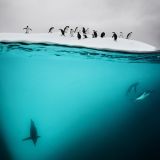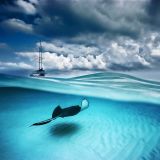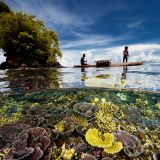David Doubilet
Two Worlds: Above and Below the Sea
Wühre, Limmatquai
David Doubilet has a long and intimate view of the sea. As a National Geographic Photographer he has spent five decades exploring and documenting the far corners of the world from beneath interior Africa, remote tropical coral reefs, rich temperate seas and recent projects beneath the polar ice. His personal challenge is to create a visual voice for the world’s oceans and to connect people to the incredible beauty and silent devastation happening within the invisible world below.
David’s Philosphy is simple: As the oceans go, so do we.
David is a contributing editor for several publications and an author of 12 titles including the award winning Water Light Time. His numerous photographic awards include Picture of the Year, BBC Wildlife, Communication Arts and World Press. David is a member of the Academy of Achievement, Royal Photographic Society, International League of Conservation Photographers and International Diving Hall of Fame. David was named a National Geographic Contributing Photographer-in-Residence in 2001.
He is the recipient of the Explorers Club Lowell Thomas Award and Lennart Nilsson Award for Scientific Photography. David is honoured to be a Rolex Testimonee since 1994.
Curated by David Doubliet and Jennifer Hayes / Printed by ![]()
Discover here contributions of ETH Zurich to the Sustainable Development Goal (SDG) 14:
Protecting our oceans
Núria Casacuberta Arola
Professor Núria Casacuberta Arola was born and raised near the sea in Barcelona, Spain. Her passion for the ocean was sparked when she had the opportunity to join a research expedition to the Pacific Ocean, to study the effects of the 2011 Fukushima nuclear disaster. As part of a scientific team sent to monitor the release of radioactive material into the Pacific Ocean, Núria contributed her expertise in the environmental sciences and used it to help investigate impacts on the ocean.
Núria believes in the power of collecting evidence and using it to understand the dynamics of the ocean. What makes her research approach distinct is the use of radioactive atoms released into the ocean from industrial processes. The dose of the radioactive contamination that Núria makes use of is not dangerous for animals or humans, but if released in large-enough amounts, it can be detected thousands of kilometres away from the source region.
Núria’s work also contributes to understanding the role oceans play in regulating the global climate.
How water travels
Part of the research focuses on detecting how the ocean moves: which pathways water masses follow, and how long they travel through ocean basins. By understanding pathways and circulation times, Núria and her team can estimate the capacity of different water masses to store substances such as greenhouse gases.
The role of oceans in mitigating climate change
Her plan is to embark on a journey to bring tracer oceanography to the forefront of ocean research, and to highlight how much oceans are changing as global climate patterns continue to shift. Núria hopes to see society become more aware of how important oceans are for regulating the Earth’s climate, and how crucial it is that they function well for our future, even for people in landlocked countries like Switzerland.
“Oceans play a vital role in regulating our climate. If we understand the dynamics of the ocean, we will also gain knowledge about its relationship with climate change.”
Prof. Dr. Núria Casacuberta Arola, Assistant Professor at the Department of Environmental Systems Science at ETH Zurich
Soft robots modelled on nature
Robert Katzschmann
A trained mechanical engineer, Professor Robert Katzschmann is fascinated by robotics. Puzzled by why most robots aren’t built to mimic the flexibility we see in nature, he set out to develop soft robots which are made of flexible materials.
Soft robotic fish
Robert began by exploring underwater robotics, guided by the natural softness of many aquatic creatures such as octopuses and fish, and inspired by their capacity to create deformable structures capable of being reshaped again and again.
His team has developed a soft robotic fish that mimics the motion of real fish through a cyclic, undulating movement. This behavior makes robotic fish less intimidating than most underwater vehicles, which rely on systems like propellers or jets that tend to disturb the delicate balance of underwater ecosystems.
Robert is using biomimicry – the practice of learning and adapting patterns from nature – to understand marine life, and build better knowledge of underwater species and their behaviours. He is developing a customisable platform for biologists whose work involves the study and imitation of fish species. He is also working on long-term environmental monitoring applications, where robots are equipped with eDNA filters to collect data on fish species and their habitats. This data helps to identify and track fish in real time.
Rethinking the robot
Convinced that we should reconsider the design and purpose of robots, Robert envisions a future where they are designed to blend into our natural environment, making them suitable for homes and workplaces. Through the use of sustainable and biodegradable materials, robots can be created with minimal environmental impact.
A gadget like a robotic fish can also attract attention from the broader public. Robert is optimistic that this can spur greater interest in ocean life and marine animals, which in turn can help people to rethink their nutrition and consumption habits to help restore habitats and fish populations.
“Creating a sustainable future requires us to understand the impact of our actions as humans and technologists. By designing systems and technologies that minimise our ecological footprint, we can pave the way for a productive yet environmentally conscious future.”
Prof. Dr. Robert Katzschmann, Head of the Soft Robotics Lab at ETH Zurich
3D-printing a new home for reef life
rrreefs
rrreefs is an ETH Spin-Off run by four women – Ulrike Pfreundt, Marie Griesmar, Hanna Kuhfuss and Josephine Graf.
Dr. Ulrike Pfreundt is an expert in tropical ocean ecosystems, she understands ocean dynamics from the point of its smallest inhabitants. After completing her Masters in fine arts, Marie Griesmar learned digital fabrication processes to further develop artificial reef structures.
When Ulrike and Marie met at the ETH Zurich, they were a perfect match. Both have a deep connection with the ocean. Their passion has been reinforced with scuba diving; a way to connect with the underwater world on another level. They’ve witnessed the beauty of coral reefs, but sadly also their degradation. This loss of biodiversity motivated them to learn about reef ecology and to find solutions to sustain those fragile ecosystems.
Rebuilding reef structures using 3D-printed clay modules
Over the last 30 years, the world has lost half of its coral reefs, and more than 90 % of all reefs are expected to vanish by 2050.
rrreefs‘ mission is to rebuild degraded coral reefs to bring back abundant marine life, that also protect shorelines and strengthen the resilience of coastal communities. Their reef systems provide a new home for reef organisms and promote the settlement of coral larvae. It is a modular system of 3D-printed rrreef modules made with natural clay.
rrreefs‘ vision for the future is to revive 1 % of coastal coral reefs by 2033. They believe that companies, institutions, and entities have a responsibility towards our planet, and they have a chance to create a positive ecological impact.
Awareness raising for coral reefs
rrreefs‘ research and fieldwork opens a space of possibilities that should inspire hope while creating impact. Anyone who wants to actively contribute to protecting coral reefs can be proactive, whether it is learning about the local challenges on the next dive vacation, collecting trash from the ocean, or supporting organizations like rrreefs from home. rrreefs can be supported by simply donating or by being part of its community to increase awareness towards the loss of coral reefs.
“We created an opportunity for changemakers and pioneers to create a positive ecological impact.”
Marie Griesmar, Co-Founder of rrreefs
open your eyes festival buerau
Botenaustrasse 42
9443 Widnau
Switzerland
Phone: +41 44 218 11 03




